An airstrike hit a TV tower in Kyiv on Tuesday as Putin's forces targeted key infrastructure and warned residents to flee. Meanwhile civilians were killed in intensified shelling of Kharkiv.
Russia escalated its attacks on Ukraine on Tuesday, unleashing a campaign of violence in urban areas as its forces closed in on the main cities. The long military convoy outside Kyiv continues to advance slowly on the capital.
 ADVERTISEMENT
ADVERTISEMENT
 ADVERTISEMENT
ADVERTISEMENT
Ukraine's second city Kharkiv saw more civilian casualties as Russian forces intensified their bombardment, hitting residential areas.
Ukrainian authorities said five people were killed in an airstrike on Kyiv's main TV tower, on the site of a World War II Holocaust memorial. "History repeating," said President Volodomyr Zelenskyy.
Russia says it plans to target key security infrastructure in the capital, warning residents to flee. Moscow has denied targeting civilian areas, despite mounting evidence to the contrary.
President Zelenskyy called on the European Union during an emotional address to MEPs to "prove that you are with us."

 ${title}
${title}
Live ended
A summary of Tuesday's key points:
- Ukrainian authorities said five people were killed in the attack on the TV tower in Kyiv. A TV control room and power substation were hit, and at least some Ukrainian channels briefly stopped broadcasting, officials said. A Jewish cemetery at the Babyn Yar Holocaust memorial was damaged.
- In intensified Russian shelling of Kharkiv, authorities said at least 10 were killed when the largest public square was hit by a missile, Zelenskyy calling the attack a war crime. Explosions tore through residential areas, with eight people reportedly killed in another airstrike. President Zelensky condemned Russian "state terrorism".
- Ukraine's president was given a standing ovation by MEPs as he called on the EU to "prove that you will not let us go", saying Ukrainians are fighting for rights, freedoms and survival". EU Commission President Ursula von der Leyen said: "The destiny of Ukraine is at stake, but our own fate also lies in the balance."
- EU diplomats and their partners at two UN conferences walked out as the Russian foreign minister Sergei Lavrov addressed them by videolink.
- Russian forces pressed their assault on other towns and cities across the country, including the strategic ports of Odesa and Mariupol in the south.
- Human Rights Watch said it documented a cluster bomb attack outside a hospital in Ukraine’s east in recent days. Local residents also reported the use of the weapons in Kharkiv and the village of Kiyanka. The Kremlin denied using cluster bombs.
- A senior U.S. defense official described the long Russian army convoy heading to Kyiv as “bogged down,” saying Russia appeared to be pausing and regrouping to evaluate how to retake the momentum in the fighting.
- On a highway between Odessa and Mykolaiv in southern Ukraine, residents piled tractor tires filled with sand and topped with sandbags to block convoys.
- Overall, the Russian military has been been stalled by fierce resistance on the ground and a surprising inability to completely dominate Ukraine’s airspace.
- The UN says more than 660,000 refugees have fled Ukraine in six days and numbers are growing "exponentially".
Watch: Diplomats walk out during Lavrov speeches at UN
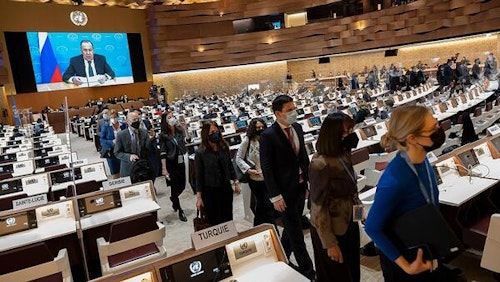
Watch: Diplomats walk out during Sergey Lavrov speeches at UN
Envoys left en masse as Russia's foreign minister addressed the United Nations in Geneva via video.Washington strikes note of caution over Russian lack of progress
The U.S. on Tuesday injected a strong note of caution into the persistent reports that Russian military progress — including by the massive convoy outside Kyiv — has slowed, plagued by food and fuel shortages and logistical problems.
One senior Defense official said that the U.S. has seen Russian military columns literally run out of gas, and in some places running out of food, and that morale is suffering as a result.
But the official added that it is important to be pragmatic. The Russians still have a significant amount of combat power that has not yet been tapped, and “they will regroup, they will adjust, they will change their tactics.”
The official spoke on condition of anonymity to discuss military assessments. Overall, the U.S. assesses that Russia has launched more than 400 missiles into Ukraine, of various types and sizes. As of Tuesday, the Ukrainian air and missile defense systems remain viable and are being used. Also, weapons from the U.S. and others continues to flow into Ukraine. The official said that the aid is getting to the Ukrainian military and troops are “actively using these systems.”
The official said Russians have made progress in the south, moving along two routes out of Crimea – one to the northeast and one to the northwest. It’s not clear that Russians have taken control of Kherson, but heavy fighting continues. And, the official said Russian forces have not yet advanced into Mariupol, but are close enough to strike into the city with long-range weapons. (AP)
Cannes Film Festival bars Russian delegations as cultural backlash intensifies
The cultural backlash against Russia's invasion of Ukraine intensified on Tuesday as the Cannes Film Festival said no Russian delegations would be welcome this year.
Meanwhile the Venice festival announced free screenings of a film about the 2014 conflict in Ukraine’s eastern Donbas region.
The announcements by Europe's two premier film festivals came on the heels of other high-profile protests in the arts, including Hollywood's decision to pull films scheduled for release in Russia, and the Munich Philharmonic's decision to fire chief conductor Valery Gergiev.
The orchestra, joined by other orchestras and festivals linked to Gergiev, cited his support for Russian President Vladimir Putin and his refusal to reject the invasion.
Cannes, which is scheduled for May, is the most global of film festivals and its international village of flag-waving pavilions annually hosts more than 80 countries from around the world.
In a statement, festival organisers said the ban on any official Russian delegation or individuals linked to the Kremlin would remain “unless the war of assault ends in conditions that will satisfy the Ukrainian people.”
The festival didn’t rule out accepting films from Russia. (AP)
Putin acts to offset Western sanctions
Vladimir Putin on Tuesday signed a decree that prohibits taking more than $10,000 (€9,000) worth of foreign currency in cash and “monetary instruments” out of Russia.
The move comes in response to the crippling sanctions Western nations have imposed on Russia over its invasion of Ukraine, which this week tanked the rouble and sent Russians flocking to banks and ATM in fear for the fate of their savings.
Other measures Putin ordered this week included obligating Russian exporters to sell 80% of their revenues in foreign currency, prohibiting Russian residents from providing non-residents with foreign currency under loan agreements and from depositing foreign currency into foreign bank accounts.
Meanwhile the total market value of Bitcoin has overtaken that of the plummeting Russian rouble, as speculation is growing that the digital coin and other cryptocurrencies could help Moscow cushion the blow of international sanctions.
Here's our write-up on that:

As sanctions hit Russia, Bitcoin overtakes plunging rouble in value
As missiles pummel Ukraine and financial sanctions slam Russia, people are increasingly turning to cryptocurrencies.Nuclear alert: Putin's order to ready Russia’s deterrent forces explained
There has been some confusion over what the Russian president's order to his generals on Sunday means specifically. Some interpret Putin’s manoeuvre as an order to prepare Russia’s nuclear forces for an attack.
Experts, however, say it is a little more complicated than that.
Read more:
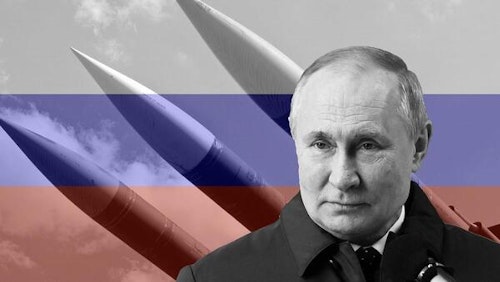
Will the war in Ukraine go nuclear? The risks of escalation explained
Vladimir Putin shocked leaders around the world on Sunday by bringing the threat of nuclear escalation into Russia’s invasion of Ukraine.UK imposes sanctions on Belarus
Is there a 'shocking distinction' over refugees in parts of the EU?
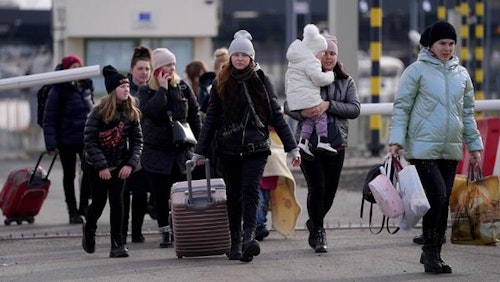
Does the Ukraine exodus reveal a ‘shocking distinction’ on refugees?
Critics say Europe should be treating all refugees equally, regardless of where they come from.Condemnation as Russian attack damages Kyiv Holocaust memorial
Holocaust remembrance organizations in Israel are condemning a Russian attack that inflicted damage to the Babi Yar Holocaust memorial.
Israeli Foreign Minister Yair Lapid issued a statement denouncing the incident, and said Israel would help repair any damage. “We are calling for the preservation and respect for this sacred site,” he said in a tweet that did not mention Russia by name.
The memorial is the site of a massacre of more than 33,000 Jews by Nazi Germany in 1941. It is located on the outskirts of Kyiv and adjacent to the city’s TV tower, where Ukrainian authorities said a Russian attack killed five people.
A spokesman for the memorial said that damage was caused to the Jewish cemetery at the site, but that assessing the full extent of the damage would have to wait until daylight.
The Babyn Yar Holocaust Memorial’s chairman, Natan Sharansky, said that Russian President Vladimir Putin “seeks to distort and manipulate the Holocaust to justify an illegal invasion of a sovereign democratic country is utterly abhorrent. It is symbolic that he starts attacking Kyiv by bombing the site of the Babyn Yar, the biggest of Nazi massacres.”
Yad Vashem, the World Holocaust Remembrance Center in Jerusalem, expressed “vehement condemnation” and called on the international community to take action “to safeguard civilian lives as well as these historical sites.”
“Rather than being subjected to blatant violence, sacred sites like Babi Yar must be protected,” it said. (AP)
Tennis world takes action against Russia and Belarus
Fact-check: No, the European Parliament has not approved Ukraine’s EU membership bid
'A scale never before seen': Europeans band together to help Ukrainians fleeing Russian invasion
After war broke out in Ukraine last week and tens of thousands began to flee to neighbouring EU countries, Diana Avram posted a message on social media offering to house Ukrainians in her dance school.
"The decision to help people came straight away in my mind because we had a dance school in Timişoara and we have enough space to accommodate people," Avram, a 37-year-old dance teacher in Romania, told Euronews.
Read the full story here.

War in Ukraine is 'historic moment for Europe', French armed forces minister says
"With the strong measures that have been taken in recent days in unity, we are facing up and France will continue to play a leading role in this European action," she said during a debate in parliament, AFP reported.
MEPs pass resolution urging EU to work with Ukraine on its membership bid
MEPs have voted overwhelmingly in favour of an EU resolution that supports working with Ukraine on its bid for EU membership.
The resolution called "for the EU institutions to work towards granting EU candidate status to Ukraine" and to continue working towards integrating the country into the single market. It also condemned Russia's violence in Ukraine.
Earlier, Ukraine President Volodymyr Zelenskyy gave an emotional speech to MEPs calling for his country to join the European Union.
Read the full story here.
Russian opera singer Anna Netrebko suspends performances
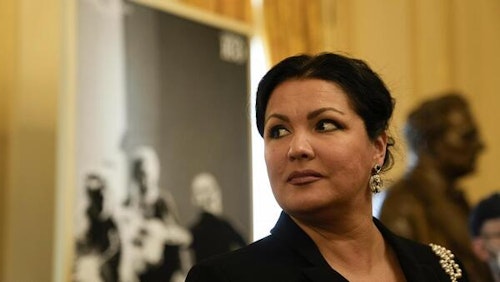
Russian opera singer Anna Netrebko suspends performances
Netrebko was originally scheduled to perform on Wednesday evening at Hamburg's Elbe Philharmonic but her concert has been postponed until September 2022.Airstrike on Kyiv TV tower causes casualties
The TV tower in Ukraine's capital has been hit, according to the country's parliament, which posted a photo of clouds of smoke around it.
Local media reported that there were several explosions and that Ukrainian TV channels stopped broadcasting shortly afterward.
Five people were killed and five injured in the strike, said the Ukrainian emergency services on Facebook.
UK vows to hit oligarchs with new law
Britain is vowing to end London’s status as a haven for oligarchs and their ill-gotten gains with a law intended to prevent the real owners of businesses and properties being hidden from view.
The government said the Economic Crime Bill will force anonymous foreign owners of U.K. property to reveal their real identities ”to ensure criminals cannot hide behind secretive chains of shell companies.” Those who don’t comply face being unable to sell their property or a five-year prison sentence.
Prime Minister Boris Johnson said the measure, which has to be approved by Parliament, would help “tear back the facade that those supporting (Russian President Vladimir) Putin’s campaign of destruction have been hiding behind for so long.”
Successive British governments have promised for years to end London’s status as a safe haven for dirty money, with little effect.
The anti-corruption group Transparency International says Russians linked to the Kremlin or accused of corruption own £1.5 billion (€1.8 billion) worth of London property, and 90,000 properties in Britain are owned by shell companies.
Johnson, who visited Poland and Estonia on Tuesday, said "people's stomachs are being turned" by Russian bombardments, earlier accusing Putin of using "barbaric and indiscriminate tactics against innocent civilians". (with AP)
Ukrainian grandmother completes seven-hour hike to freedom
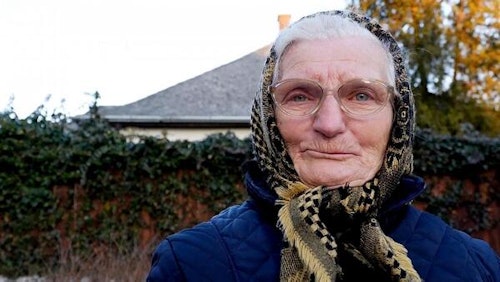
80-year-old Ukrainian grandmother completes seven-hour hike to freedom
As refugees continue to flee the Russian invasion of Ukraine, this 80-year-old grandmother was forced to make a hard decision - stay in her lifelong home, or leave in search of safetyWorld Athletics Council bans Russian and Belarusian athletes
No need to change nuclear alert level, says NATO chief
NATO’s chief says the alliance sees no need to change its nuclear weapons alert level, despite Russia’s threats.
NATO's secretary-general, Jens Stoltenberg, spoke to The Associated Press following talks on European security with Polish President Andrzej Duda an air base in Poland where NATO’s Polish and U.S. fighter jets are based.
“We will always do what is needed to protect and defend our allies, but we don’t think there is any need now to change the alert levels of NATO’s nuclear forces,” Stoltenberg said.
The Kremlin has raised the specter of nuclear war, reporting on Monday that its land, air and sea nuclear forces were on high alert following President Vladimir Putin’s weekend order. NATO itself has no nuclear weapons, but three of its members, the United States, Britain and France, do. (AP)
Boris Johnson taken to task by Ukrainian journalist
Ukrainian journalist Daria Kaleniuk was overcome with emotion as she questioned UK Prime Minister Boris Johnson in a briefing during his visit to Poland, over Britain's plans to help Ukraine on Monday.
She urged Britain and NATO allies to enforce a no-fly zone over her country to protect people from Russia's bombardment.
"You are talking about the stoicism of the Ukrainian people but Ukrainian women and children are in deep fear because of bombs and missiles coming from the sky," she said.
"We are asking for a no-fly zone," she added, "NATO is not willing to defend, because NATO is afraid of the World War III. But it is already started."
Johnson said the implication of that would be that the UK forces would be engaged in a direct combat with Russians.
"That is not something we can do and that have envisaged," Johnson said.
Johnson said the the UK was the first European country to offer military assistance, also "doing everything we can to tighten the economic noose around the Putin regime."
"And I have to tell you, I think that it will work," Johnson said.
Watch the full exchange here:
Kharkiv: Eight more killed in strike on residential area -- Ukrainian authorities
"Eight people died, six were injured and 38 people were rescued" after "an airstrike", the Ukrainian emergency service said on Facebook, posting photos of rescuers working in a damaged building.
At least 11 people were killed in the city on Monday. (AFP)
European Human Rights Court calls on Moscow to avoid targeting civilians
Scholz: 'Ukraine is literally fighting for survival'
German Chancellor Olaf Scholz on Tuesday called on Russian President Vladimir Putin to stop the fighting in Ukraine immediately, withdraw his troops and return to dialogue.
Scholz said after meeting Luxembourg's prime minister in Berlin that "the bloodshed must come to an end -- Vladimir Putin is assaulting the Ukrainian people."
The chancellor pointed to the economic effects of sanctions that have already been imposed on Russia and said that more will follow. He didn't give details.
Scholz deflected a question about whether NATO should respond to Putin's decision to put Russia's nuclear forces on high alert, saying that the focus needs to be on stopping fighting that is likely to get worse.
He said that "Ukraine is literally fighting for survival" and reports of large-scale Russian troop movements suggest that "this will be a very, very dramatic time."
Scholz added: "The pictures we have lamented so far … will only be the beginning of what is probably still coming." (AP)
'6,000 arrests' in Russia during protests over Ukraine war, says human rights group
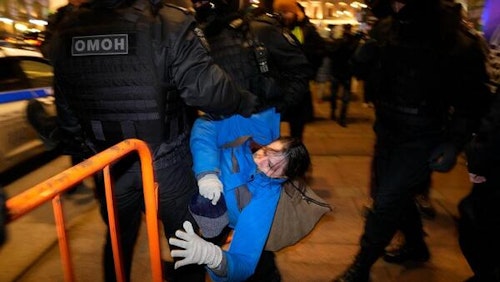
'More than 6,000 arrests' in Russia during protests over Ukraine war
Russia, like the rest of Europe, has also seen regular protests about Russia's invasion of Ukraine.Russian army 'ready to target Ukrainian security infrastructure in Kyiv'
"In order to stop the computer attacks against Russia, strikes with high-precision weapons will be carried out against technological infrastructures of the SBU (Ukrainian Security Service) and the main centre of the Psychological Operations Unit in Kyiv", said Russian Defence Ministry spokesman Igor Konashenkov.
"We call on... Kyiv residents living near broadcast centers to leave their homes," he added.
These declarations come at a time when the Russian forces are stepping up their efforts to seize the capital.
A Russian armoured convoy several tens of kilometres long is approaching Kyiv from the northwest, according to satellite images published overnight from Monday to Tuesday. (AFP)
Access to Sea of Azov blocked for Ukrainian troops: Russia
UK unblocks €264 million of emergency and humanitarian aid
EU Parliament translator becomes emotional during Zelenskyy address
Ukraine 'belongs in our European family': VDL
Europeans understand sanctions will hurt us too: VDL
'There is another Russia beyond Putin': Commission chief
European defence evolving fast: VDL
EU Commission calls for Protection Mechanism to be activated for Ukrainian refugees
Ten dead in Kharkiv bombing, say emergency services
At least ten people died during a Russian bombing in Kharkiv -- Ukraine's second-largest city -- on Tuesday morning, report AFP, quoting emergency services.
"At least ten people were killed, more than 20 injured," said Ukrainian emergency services. "Rescuers and volunteers rescued 10 people from the rubble, according to a preliminary count,". victims of the rubble of a building."
Ukrainian parliament chairman urges EU to accept country's membership aspirations
Ruslan Stefanchuk said Ukraine's right to be a democratic state was ruined by the Russian invasion, urging the EU to accept Ukraine's EU membership aspirations.
"Let's understand that there cannot be peace in Europe without Ukraine. There could not be integral Europe without Ukraine," Stefanchuk said.
He pointed out that Europe was fighting an aggressor and said that "Ukraine is defending the borders of the civilised world".
Stefanchuk added that he had sheltered four times in his basement amid Russian attacks on the country.
He also warned that Russia might not just stop at Ukraine, asking: "to which other regions will the Kremlin look after it conquers Ukraine."
'Russia stop the war, go home, let's talk', EU Council chief says
"It's also our duty to rise to this historic moment," he told the EU parliament.
He said that the economic sanctions imposed on Russia were "massive and unprecedented". He said they would impose a cost on Europe but that it was a price worth paying because EU values were at stake.
We want to be 'equal members of Europe', Zelenskyy says
"We are fighting for our rights, for our freedoms and now we’re fighting for survival… We are also fighting to be equal members of Europe," Zelenskyy said in a passionate appeal to the European Parliament.
'This must be our whatever it takes moment', Metsola says
"Europe stands ready to go further still," Metsola said, adding that they would work towards Ukraine's goal to join the European Union.
Metsola told the EU parliament that Europe could no longer be at the "behest of autocrats" for energy security, that it should not be a place for Russian money, that the EU should move to have a real security and defence union, and that Europe should fight the Kremlin's disinformation campaign.
Around one million people in Ukraine internally displaced, UN says
Karolina Lindholm Billing, UNHCR's head for Ukraine, said that while the organisation did not have a firm figure for the number of internally displaced people, they estimate that about one million people have fled inside the country or are on a train, bus or car trying to get to safety.
'Unacceptable' for US nuclear weapons to be located in some European countries: Lavrov
Several 'victims' in Kherson after Russian shelling
Maersk suspends shipping to Russia
The group, which competes with Italy's MSC for the world's largest container shipping market, will however honour orders placed so far, while respecting the sanctions against Moscow, it said in a statement.
"As the stability and security of our operations are already directly and indirectly affected by the sanctions, Maersk's new sea and land bookings to and from Russia will be temporarily suspended, with the exception of food, medical and humanitarian goods," the group wrote.
More than 660,000 refugees have fled Ukraine in six days: UN
Russian and Belarus figure skaters banned from competing: Federation
Belarusian troops have crossed the border: Ukraine
6,000 Russian troops killed: Ukrainian official
Ukraine accuses Russia of violating Geneva Conventions with thermobaric weapons
YouTube blocks RT and Sputnik channels in Europe
Zelenskyy to speak to MEPs at 12:30
Power in Mariupol cut off after Russian shelling: Governor
Western sanctions will 'cause the collapse of the Russian economy': French minister
'Russian advance on Kyiv has made little progress': UK
Ukrainian cyber police call on VPN services to 'stop cooperating' with Russia
Two Chechen soldiers killed: Regional chief
Ukrainian emergency services release images from Kharkiv
Kharkiv is Ukraine's second-biggest city, with a population of about 1.5 million. Authorities said at least seven people had been killed and dozens injured due to Russian shelling.
Record 100,000 cross Poland-Ukraine border
Russian army sets up checkpoints around Black Sea city of Kherson
Hollywood studios pull new films from Russia
Three major Hollywood studios have moved to pause their upcoming theatrical releases in Russia, including rolling out “The Batman” in theaters there this week.
Warner Bros., the Walt Disney Co. and Sony Pictures said Monday that they would “pause” the release of their films in Russia. Each studio has significant upcoming releases that had been set to debut internationally in the coming weeks. “The Batman,” one of the year’s more anticipated films, launches Friday in North America and many overseas territories.
Warner Bros.′ move closely followed a similar decision Monday by the Walt Disney Co. The studio had planned to open the Pixar film “Turning Red” in Russia on March 10. That film is going straight to Disney+ in the U.S.
Sony followed suit, saying it would delay its release of the comic book film “Morbius” in Russia.
Russia is not a leading market for Hollywood, but the country typically ranks in the top dozen countries globally in box office.
EU defense ministers to meet on Tuesday
Majority of Finns back joining NATO for first time: Poll
Ukraine claims to have cut phone access for Russian numbers
Tuesday
- A deadly airstrike on a TV tower in Kyiv reportedly killed five and interrupted broadcasting. President Zelenskyy condemned the attack at a prominent World War II memorial location.
- Moscow warned that the military would strike "security infrastructure" in the capital and that civilians living nearby should flee. A long armoured convoy continues its advance.
- Ukraine's president was given a standing ovation by MEPs as he called on the EU to "prove that you will not let us go", saying Ukrainians are fighting for rights, freedoms and survival". EU Commission President Ursula von der Leyen said: "The destiny of Ukraine is at stake, but our own fate also lies in the balance."
- In intensified Russian shelling of Kharkiv, authorities said at least 10 were killed when the largest public square was hit by a missile, Zelenskyy calling the attack a war crime. Explosions tore through residential areas, with eight people reportedly killed in another airstrike.
- Vladimir Putin's forces pressed their attack on other towns and cities across the country, including the strategic ports of Odessa and Mariupol in the south.
- The UN says more than 660,000 refugees have fled Ukraine in six days and numbers are growing "exponentially".
- EU diplomats and their partners at two UN conferences walked out as the Russian foreign minister Sergei Lavrov addressed them by videolink.
- Monday's events saw a series of intensified sanctions and bans on Russian economic and sporting activity, leaving Putin increasingly isolated.
Russia feeling impact of Western sanction: US official
70 Ukrainian soldiers killed in Russian artillery strike: Official
More than 70 Ukrainian soldiers were killed after Russian artillery hit a military base in Okhtyrka, a city between Kharkiv and Kyiv, the head of the region wrote on Telegram.
Dmytro Zhyvytskyy posted photographs of the charred shell of a four-story building and rescuers searching rubble. In a later Facebook post, he said many Russian soldiers and some local residents also were killed during the fighting on Sunday. The report could not immediately be confirmed.










